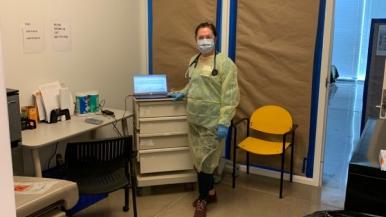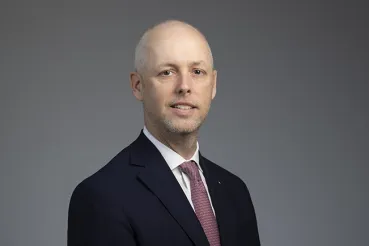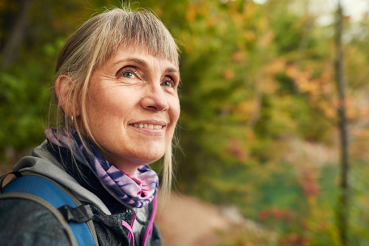As cases of COVID-19 spiked in March, the organization teamed up with Rush University Medical Center, the Chicago Department of Public Health and the Heartland Alliance to form the COVID-19 Medical Respite Center. A Safe Haven contributed the space for the facility, while Rush and the Heartland Alliance went to work providing medical services and behavioral care, respectively.
Angela Moss, APN-BC, adult nurse practitioner and assistant dean of faculty practice in the Rush University College of Nursing, has led the nursing effort at A Safe Haven since the respite facility opened.
A Safe Haven of Chicago, a Rush University Medical Center partner, has won a 19th annual Chicago Innovation Award. The organization received the award in the Non-Profit Category for its conversion of a 7,000-square-foot space into an isolation ward for people who tested positive for COVID-19 and could not isolate at home or who are homeless.
A Safe Haven provides support and services such as shelters, job training and access to affordable housing for those transitioning from homelessness to self-sufficiency.
“Being able to be a part of something like this gives me fuel and hope that we don't have to tolerate what's just good enough and that we can make a difference," said Moss. “We can change things for the better."
Once diagnosed with COVID-19 at a shelter or hospital, those who lack shelter and are no longer in need of hospitalization can receive a bed at Safe Haven. There, they are treated and cared for until their isolation period ends. Rush medical practitioners at the respite center help manage and observe patients' COVID-19 symptoms while also providing some primary care, such as checking blood pressure or ensuring patients get medication for any pre-existing conditions.
The Chicago Innovation Awards honor the most innovative new product or service in the Chicago area for that given year. The coalition's hard work over the past seven months is recognized in the winning of this award.
“This award reflects the ingenuity and dedication of the entire Rush clinical team working in the CDPH-ASH isolation unit for people experiencing homelessness and COVID-19," said Moss. “The outcomes are inspiring, and we hope will in turn inspire other health systems, shelter providers, city governances, and indeed, society as a whole to think differently about health care rights and best practices for people experiencing homelessness."




